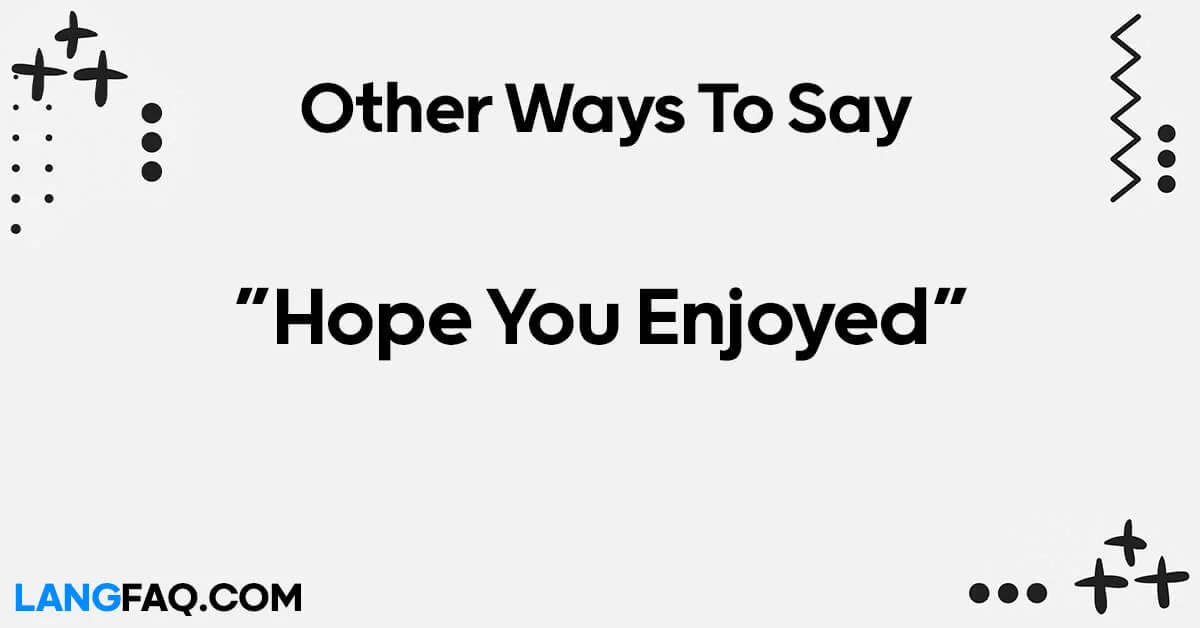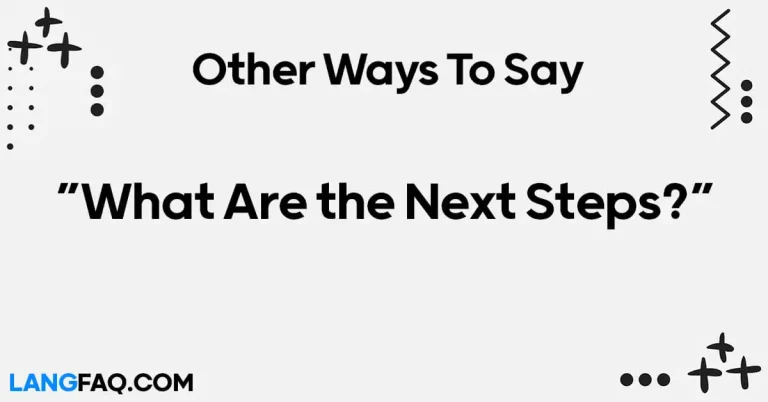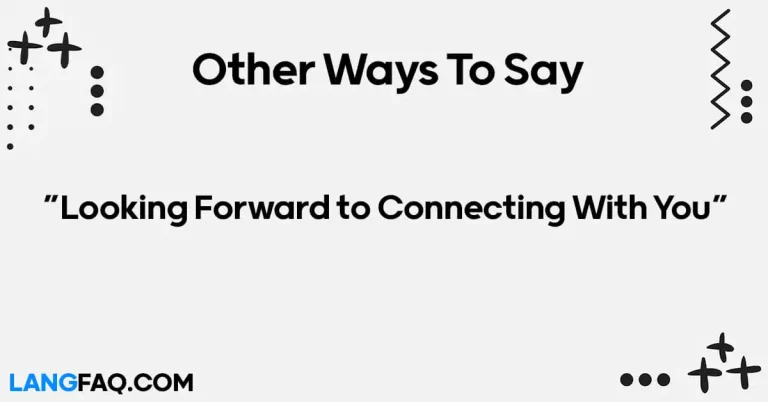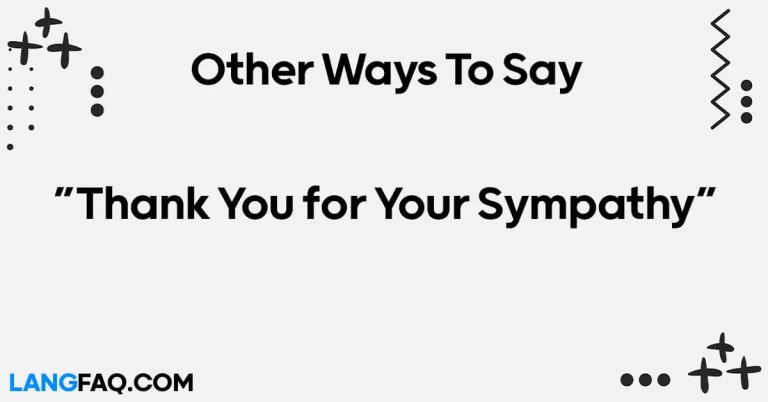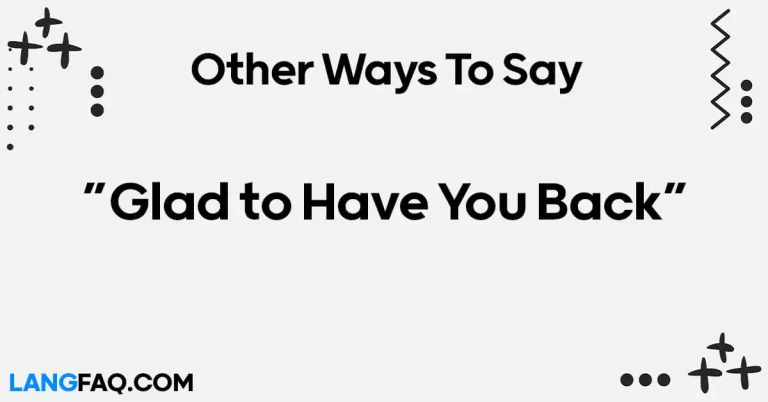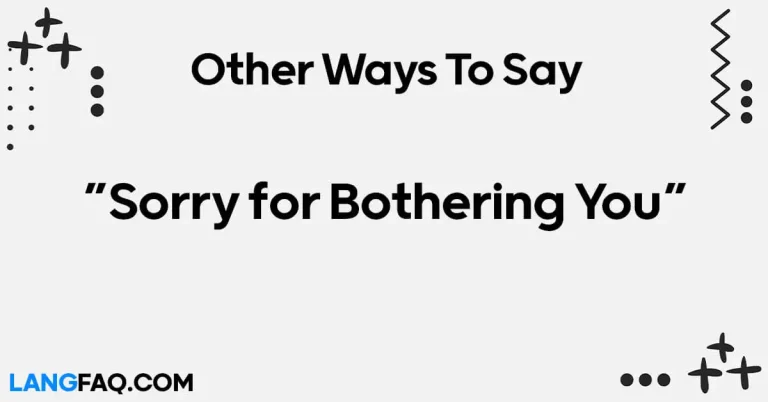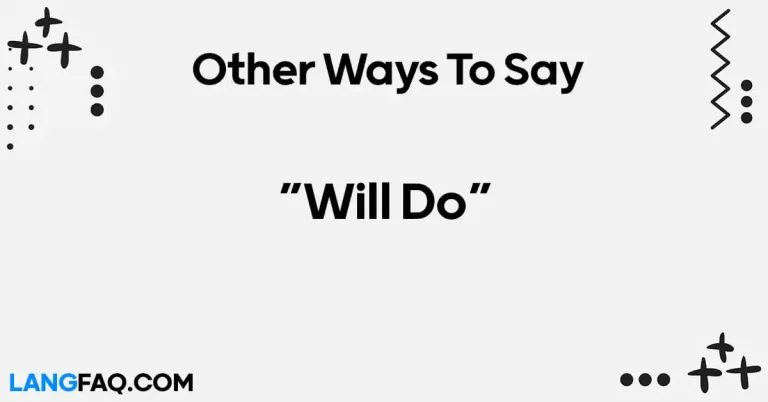Welcome to a linguistic journey where we delve into alternative expressions for “Hope You Enjoyed.” In this article, we’ll explore twelve different ways to convey this sentiment, providing you with versatile phrases to enrich your communication repertoire. Whether you’re bidding farewell after an event or wrapping up a conversation, these alternatives offer diversity and nuance to your expressions. Let’s embark on this exploration together!
12 Other Ways to Say “Hope You Enjoyed”
Here are 12 alternative ways to say “Hope You Enjoyed”:
- Trust you had a great time.
- Wish you found it enjoyable.
- Desire you had a pleasant experience.
- Expect you had a wonderful time.
- Pray it brought you happiness.
- Anticipate you had fun.
- Look forward to your enjoyment.
- Wish you derived pleasure from it.
- Hope it was to your liking.
- Trust it was fulfilling.
- Wish you relished every moment.
- Pray it left you with fond memories.
Here’s a table with meanings and examples for the 12 alternative ways to say “Hope You Enjoyed”:
| Alternative Expression | Meaning | Example |
|---|---|---|
| Trust you had a great time. | Expressing confidence in someone’s enjoyment. | “Trust you had a great time at the party.” |
| Wish you found it enjoyable. | Hoping someone found an experience pleasurable. | “Wish you found the movie enjoyable.” |
| Desire you had a pleasant experience. | Expressing a wish for someone’s enjoyment. | “Desire you had a pleasant experience at the event.” |
| Expect you had a wonderful time. | Anticipating someone had a great experience. | “Expect you had a wonderful time on your vacation.” |
| Pray it brought you happiness. | Expressing a hope for someone’s happiness. | “Pray it brought you happiness on your special day.” |
| Anticipate you had fun. | Expressing an expectation of enjoyment. | “Anticipate you had fun at the concert.” |
| Look forward to your enjoyment. | Eagerly awaiting someone’s enjoyment. | “Look forward to your enjoyment at the show.” |
| Wish you derived pleasure from it. | Hoping someone derived pleasure from an experience. | “Wish you derived pleasure from the book.” |
| Hope it was to your liking. | Expressing a wish for something to be enjoyable. | “Hope it was to your liking at the restaurant.” |
| Trust it was fulfilling. | Expressing confidence in the satisfaction of an experience. | “Trust it was fulfilling at the workshop.” |
| Wish you relished every moment. | Hoping someone enjoyed every part of an experience. | “Wish you relished every moment of the trip.” |
| Pray it left you with fond memories. | Expressing a hope for lasting positive memories. | “Pray it left you with fond memories of the event.” |
In conclusion, there are numerous ways to convey the sentiment of “Hope You Enjoyed,” each offering unique nuances and expressions of goodwill towards others. By incorporating these alternative phrases into your communication, you can enrich your interactions and foster positive connections with those around you.
Is It Correct to Say “Hope You Enjoyed”?
Yes, “Hope you enjoyed” is a grammatically correct phrase. It is commonly used to express a wish or desire for someone to have experienced enjoyment or satisfaction in the past. This phrase is often used at the conclusion of an event, activity, or interaction to convey well-wishes and positive sentiments to the other person.
For example:
- “Thanks for joining us for dinner last night. Hope you enjoyed the meal!”
- “I sent you the latest book by your favorite author. Hope you enjoyed reading it.”
- “We had a great time hosting the party. Hope you enjoyed yourself.”
In these examples, “Hope you enjoyed” is used to express the speaker’s hope that the other person found the experience enjoyable or satisfying. It is a friendly and polite way to convey positive wishes and sentiments.
Professional Mail Example With “Hope You Enjoyed”
Subject: Follow-Up on Our Recent Meeting
Dear [Recipient’s Name],
I hope this email finds you well. I wanted to take a moment to express my gratitude for your time during our meeting yesterday. It was a pleasure discussing [topic] with you and gaining your insights.
I wanted to follow up and ensure that everything met your expectations and that you found our discussion beneficial. Hope you enjoyed our conversation and that it provided valuable insights for your upcoming project.
If you have any further questions or need clarification on any points we discussed, please don’t hesitate to reach out. I’m here to assist you in any way I can.
Looking forward to our continued collaboration and wishing you a productive week ahead.
Best regards, [Your Name]
Trust you had a great time
Expressing confidence in someone’s enjoyment is crucial for fostering positive relationships and leaving a lasting impression. Whether you’re bidding farewell to guests at an event or wrapping up a meeting, conveying trust in their enjoyment can enhance rapport and goodwill.
Formal Context:
In a professional setting, expressing trust in someone’s enjoyment can be a polite and courteous way to conclude a business meeting or event. For example, after hosting a corporate conference, you might say, “Trust you had a great time at the conference. We look forward to working with you in the future.”
Informal Context:
Similarly, in more casual settings among friends or acquaintances, expressing trust in their enjoyment can strengthen social bonds. For instance, after hosting a dinner party, you could say, “Thanks for coming over! Trust you had a great time. Let’s do this again soon!”
Variations:
- Colleague: “Trust the meeting was productive.”
- Friend: “Trust you had a blast at the concert.”
- Mentor-Mentee: “Trust the training session was insightful.”
Example Sentence: “Trust you had a great time at the movie last night.”
Email Sample:
Subject:
Re: Thank You for Attending the Networking Event
Hi [Recipient’s Name],
I wanted to extend my gratitude for attending the networking event yesterday. Trust you had a great time connecting with industry peers and gaining valuable insights. Looking forward to future collaborations!
Best regards,
[Your Name]
Dictionary Insight: According to Cambridge Dictionary, “trust” implies having confidence in something or someone’s abilities or character.
Usage Tips:
- Use “trust” in contexts where you are confident in someone’s enjoyment or satisfaction.
- Maintain a positive and friendly tone to ensure sincerity in your expression of trust.
Pros:
- Conveys confidence and goodwill.
- Enhances rapport and fosters positive relationships.
Cons:
- May come across as insincere if not genuine.
- Requires careful consideration of the recipient’s feelings and experiences.
Related Grammar/Usage Rules:
- “Trust” can be followed by past tense verbs to express confidence in someone’s past enjoyment or satisfaction.
- Example: “Trust you had a great time” (past tense) vs. “Hope you have a great time” (present tense).
Exceptions:
- Avoid using “trust” in situations where you are uncertain about the recipient’s experience or feelings.
- Instead, opt for more neutral expressions such as “Thank you for attending” or “Hope you enjoyed.”
Incorporating “trust you had a great time” into your communication repertoire can add warmth and sincerity to your interactions, leaving a positive impression on others.
Wish you found it enjoyable
Expressing a wish for someone to find an experience enjoyable is a thoughtful way to convey goodwill and positivity. Whether you’re concluding a conversation or bidding farewell, expressing this sentiment can leave a lasting impact.
Formal Context:
In professional settings, expressing a wish for someone to find an experience enjoyable can be a courteous way to conclude a meeting or event. For example, after presenting a project to colleagues, you might say, “Wish you found the presentation enjoyable. We appreciate your feedback.”
Informal Context:
Similarly, in casual settings among friends or family, expressing a wish for enjoyment can strengthen relationships and foster camaraderie. For instance, after hosting a game night, you could say, “Thanks for coming over! Wish you found the games enjoyable. Let’s plan another one soon!”
Variations:
- Colleague: “Wish you found the training session informative.”
- Friend: “Wish you found the movie entertaining.”
- Mentor-Mentee: “Wish you found the guidance helpful.”
Example Sentence: “Wish you found the concert enjoyable. Let me know your favorite part!”
Email Sample:
Subject: Feedback on the Team Building Activity
Hi [Recipient’s Name],
I hope you found yesterday’s team building activity enjoyable. Your feedback would be greatly appreciated as we plan future events. Looking forward to hearing from you!
Best regards,
[Your Name]
Dictionary Insight: According to Oxford Languages, “wish” is defined as expressing a desire or hope for something to happen or be the case.
Usage Tips:
- Use “wish” to express sincere hopes or desires for someone’s enjoyment or satisfaction.
- Tailor your expression to suit the context and relationship with the recipient.
Pros:
- Conveys genuine wishes for someone’s enjoyment.
- Adds warmth and positivity to conversations and interactions.
Cons:
- May feel generic if not accompanied by personalized sentiments.
- Requires sincerity and consideration of the recipient’s preferences and experiences.
Related Grammar/Usage Rules:
- “Wish” is often followed by past tense verbs to express hopes or desires for past events or experiences.
- Example: “Wish you found it enjoyable” (past tense) vs. “Hope you find it enjoyable” (present tense).
Exceptions:
- Avoid using “wish” in situations where the recipient’s enjoyment or satisfaction is uncertain.
- Opt for more neutral expressions such as “Thank you for attending” or “Hope you enjoyed” instead.
Incorporating “wish you found it enjoyable” into your communication can convey warmth and sincerity, leaving a positive impression on others.
Desire you had a pleasant experience
Expressing a desire for someone to have a pleasant experience is a courteous way to conclude interactions and leave a positive impression. Whether in formal or informal settings, conveying this sentiment shows thoughtfulness and consideration for the other person’s enjoyment.
Formal Context:
In professional settings, expressing a desire for a pleasant experience can be a professional and polite way to conclude business meetings or interactions. For example, after a client presentation, you might say, “Desire you had a pleasant experience reviewing our proposal. We look forward to your feedback.”
Informal Context:
Similarly, in casual settings among friends or acquaintances, expressing a desire for a pleasant experience can enhance social bonds and foster goodwill. For instance, after hosting a dinner party, you could say, “Thanks for coming! Desire you had a pleasant experience. Let’s catch up again soon!”
Variations:
- Colleague: “Desire you had a productive meeting.”
- Friend: “Desire you had a great time at the concert.”
- Mentor-Mentee: “Desire you found our discussion insightful.”
Example Sentence: “Desire you had a pleasant experience exploring the city. Let me know if you need any recommendations!”
Email Sample:
Subject: Follow-Up on Our Networking Lunch
Hi [Recipient’s Name],
I trust our networking lunch was productive for you. Desire you had a pleasant experience discussing potential collaborations. Looking forward to our continued partnership.
Best regards,
[Your Name]
Dictionary Insight: According to Merriam-Webster, “desire” is defined as a longing or craving for something to happen.
Usage Tips:
- Use “desire” to express genuine wishes for someone’s enjoyment or satisfaction.
- Tailor your expression to suit the context and maintain a positive tone.
Pros:
- Conveys sincere wishes for a pleasant experience.
- Demonstrates thoughtfulness and consideration for the other person’s well-being.
Cons:
- May feel formal or overly polite in very casual settings.
- Requires sincerity and genuine concern for the other person’s experience.
Related Grammar/Usage Rules:
- “Desire” is often followed by past tense verbs to express wishes for past experiences.
- Example: “Desire you had a pleasant experience” (past tense) vs. “Hope you have a pleasant experience” (present tense).
Exceptions:
- Avoid using “desire” in situations where the recipient’s enjoyment or satisfaction is uncertain.
- Opt for more neutral expressions such as “Thank you for attending” or “Hope you enjoyed” instead.
Incorporating “desire you had a pleasant experience” into your communication can convey warmth and thoughtfulness, leaving a positive impression on others.
Expect you had a wonderful time
Anticipating that someone had a wonderful time is a proactive way to express positivity and optimism. Whether in formal or informal contexts, conveying this sentiment can foster goodwill and strengthen relationships.
Formal Context:
In professional settings, expressing an expectation for someone to have had a wonderful time can be a polite and courteous way to conclude business meetings or events. For example, after hosting a corporate retreat, you might say, “Expect you had a wonderful time networking and learning. We value your participation.”
Informal Context:
Similarly, in casual settings among friends or family, expressing an expectation for a wonderful time can enhance social bonds and reinforce positive experiences. For instance, after hosting a birthday party, you could say, “Thanks for celebrating with us! Expect you had a wonderful time. Let’s plan another gathering soon!”
Variations:
- Colleague: “Expect you found the training session valuable.”
- Friend: “Expect you enjoyed the movie night.”
- Mentor-Mentee: “Expect you gained insights from our discussion.”
Example Sentence: “Expect you had a wonderful time exploring the museum. Can’t wait to hear about your favorite exhibits!”
Email Sample:
Subject: Recap of the Annual Conference
Hi [Recipient’s Name],
I hope you had a safe trip back. Expect you had a wonderful time at the conference and found the sessions informative. Looking forward to discussing your key takeaways.
Best regards,
[Your Name]
Dictionary Insight: According to Collins Dictionary, “expect” is defined as to look forward to the probable occurrence or appearance of something.
Usage Tips:
- Use “expect” to express optimism and anticipation for someone’s enjoyment or satisfaction.
- Maintain a positive and upbeat tone to convey genuine optimism.
Pros:
- Conveys optimism and positivity about someone’s experience.
- Demonstrates thoughtfulness and consideration for the other person’s enjoyment.
Cons:
- May feel presumptuous if not expressed sincerely.
- Requires a good understanding of the recipient’s preferences and experiences.
Related Grammar/Usage Rules:
- “Expect” is often followed by past tense verbs to express expectations for past experiences.
- Example: “Expect you had a wonderful time” (past tense) vs. “Hope you have a wonderful time” (present tense).
Exceptions:
- Avoid using “expect” in situations where the recipient’s enjoyment or satisfaction is uncertain.
- Opt for more neutral expressions such as “Thank you for attending” or “Hope you enjoyed” instead.
Pray it brought you happiness
Expressing a prayer for someone’s happiness is a heartfelt way to convey warmth and sincerity. Whether in formal or informal contexts, offering this sentiment shows genuine care and consideration for the other person’s well-being.
Formal Context:
In professional settings, expressing a prayer for someone’s happiness can be a sincere and empathetic way to conclude business interactions or events. For example, after a challenging project, you might say, “Pray it brought you happiness to see the successful outcome. Your contributions were invaluable.”
Informal Context:
Similarly, in casual settings among friends or family, expressing a prayer for happiness can deepen emotional connections and reinforce positive relationships. For instance, after a heartfelt conversation, you could say, “Thanks for sharing with me. Pray it brought you happiness to open up. I’m here for you.”
Variations:
- Colleague: “Pray it brought you joy to accomplish your goals.”
- Friend: “Pray it brought you laughter and joy.”
- Mentor-Mentee: “Pray it brought you clarity and peace of mind.”
Example Sentence: “Pray it brought you happiness to receive the birthday surprise. You deserve all the joy in the world!”
Email Sample:
Subject: Reflections on Our Team Building Activity
Hi [Recipient’s Name],
I wanted to express my gratitude for your participation in the team building activity. Pray it brought you happiness and strengthened our team bonds. Looking forward to more collaborative efforts.
Best regards,
[Your Name]
Dictionary Insight: According to Lexico, “pray” is defined as an expression of a hope or wish.
Usage Tips:
- Use “pray” to convey heartfelt wishes for someone’s happiness or well-being.
- Maintain a sincere and empathetic tone to express genuine care and concern.
Pros:
- Conveys deep empathy and sincerity.
- Demonstrates genuine care and concern for the other person’s happiness.
Cons:
- May feel overly sentimental in very formal settings.
- Requires sensitivity to the recipient’s feelings and experiences.
Related Grammar/Usage Rules:
- “Pray” is often followed by past tense verbs to express hopes or wishes for past experiences.
- Example: “Pray it brought you happiness” (past tense) vs. “Hope it brings you happiness” (present tense).
Exceptions:
- Avoid using “pray” in situations where the recipient’s feelings or experiences may be sensitive or uncertain.
- Opt for more neutral expressions such as “Thank you for your participation” or “Hope you enjoyed” instead.
Incorporating “pray it brought you happiness” into your communication can convey deep empathy and sincerity, leaving a lasting positive impression on others.
Anticipate you had fun
Anticipating that someone had fun is an upbeat way to express positivity and excitement. Whether in formal or informal contexts, offering this sentiment shows enthusiasm and optimism for the other person’s enjoyment.
Formal Context:
In professional settings, expressing an anticipation for someone to have had fun can be a cheerful and engaging way to conclude business interactions or events. For example, after hosting a team-building activity, you might say, “Anticipate you had fun bonding with your colleagues. Your enthusiasm was contagious.”
Informal Context:
Similarly, in casual settings among friends or family, expressing an anticipation for fun can create a sense of excitement and anticipation. For instance, after organizing a game night, you could say, “Thanks for coming! Anticipate you had fun playing games. Let’s make this a regular thing!”
Variations:
- Colleague: “Anticipate you found the workshop informative and enjoyable.”
- Friend: “Anticipate you had a blast at the party.”
- Mentor-Mentee: “Anticipate you gained valuable insights from our discussion.”
Example Sentence: “Anticipate you had fun exploring the new hiking trail. Can’t wait to hear all about it!”
Email Sample:
Subject: Reflections on Our Team Outing
Hi [Recipient’s Name],
I hope you had a fantastic time at our team outing. Anticipate you had fun and built strong connections with your colleagues. Looking forward to future team-building activities.
Best regards,
[Your Name]
Dictionary Insight: According to Merriam-Webster, “anticipate” is defined as to look forward to or to expect.
Usage Tips:
- Use “anticipate” to convey excitement and optimism for someone’s enjoyment or satisfaction.
- Maintain an upbeat and enthusiastic tone to enhance engagement and positivity.
Pros:
- Conveys enthusiasm and optimism for the other person’s experience.
- Creates a sense of anticipation and excitement for future interactions.
Cons:
- May feel overly informal in very formal settings.
- Requires genuine enthusiasm and positivity to be effective.
Related Grammar/Usage Rules:
- “Anticipate” is often followed by past tense verbs to express expectations for past experiences.
- Example: “Anticipate you had fun” (past tense) vs. “Hope you have fun” (present tense).
Exceptions:
- Avoid using “anticipate” in situations where the recipient’s enjoyment or satisfaction may be uncertain or sensitive.
- Opt for more neutral expressions such as “Thank you for your participation” or “Hope you enjoyed” instead.
Look forward to your enjoyment
Expressing anticipation for someone’s enjoyment is a warm and welcoming way to conclude interactions and leave a positive impression. Whether in formal or informal contexts, conveying this sentiment shows genuine interest and care for the other person’s well-being.
Formal Context:
In professional settings, expressing anticipation for someone’s enjoyment can be a courteous and professional way to conclude business interactions or events. For example, after hosting a client meeting, you might say, “Look forward to your enjoyment of the product demonstration. Your feedback will be invaluable.”
Informal Context:
Similarly, in casual settings among friends or family, expressing anticipation for enjoyment can create a sense of excitement and camaraderie. For instance, after planning a day trip, you could say, “Thanks for joining us! Look forward to your enjoyment of the scenic views. Let’s make some unforgettable memories!”
Variations:
- Colleague: “Look forward to your insights from the presentation.”
- Friend: “Look forward to your laughter and smiles at the comedy show.”
- Mentor-Mentee: “Look forward to your growth and development in the upcoming training.”
Example Sentence: “Look forward to your enjoyment of the delicious meal. Bon appétit!”
Email Sample:
Subject: Recap of Our Networking Event
Hi [Recipient’s Name],
I trust you had a pleasant time at our networking event. Look forward to your enjoyment of the connections made and the insights shared. Let’s stay in touch for future collaborations.
Best regards,
[Your Name]
Dictionary Insight: According to Oxford Languages, “look forward to” is defined as to eagerly anticipate or await something.
Usage Tips:
- Use “look forward to” to convey genuine interest and anticipation for someone’s enjoyment or satisfaction.
- Maintain a friendly and welcoming tone to enhance engagement and positivity.
Pros:
- Conveys genuine interest and care for the other person’s experience.
- Creates a sense of anticipation and excitement for future interactions.
Cons:
- May feel overly formal in very casual settings.
- Requires sincerity and genuine interest in the other person’s well-being.
Related Grammar/Usage Rules:
- “Look forward to” is often followed by gerunds (verb + ing) to express anticipation for future experiences.
- Example: “Look forward to your enjoyment” (gerund) vs. “Hope you enjoy” (infinitive).
Exceptions:
- Avoid using “look forward to” in situations where the recipient’s enjoyment or satisfaction may be uncertain or sensitive.
- Opt for more neutral expressions such as “Thank you for your participation” or “Hope you enjoyed” instead.
Wish you derived pleasure from it
Expressing a wish for someone to have derived pleasure from an experience is a thoughtful way to convey goodwill and positivity. Whether in formal or informal contexts, offering this sentiment shows genuine concern for the other person’s enjoyment and satisfaction.
Formal Context:
In professional settings, expressing a wish for someone to have derived pleasure from an experience can be a polite and courteous way to conclude business interactions or presentations. For example, after delivering a project update, you might say, “Wish you derived pleasure from the presentation. Your feedback is greatly appreciated.”
Informal Context:
Similarly, in casual settings among friends or family, expressing a wish for enjoyment can strengthen relationships and foster positivity. For instance, after recommending a book, you could say, “Hope you derived pleasure from reading it. Let’s discuss your favorite parts!”
Variations:
- Colleague: “Wish you derived insights from the training session.”
- Friend: “Wish you derived joy from the surprise party.”
- Mentor-Mentee: “Wish you derived value from our mentorship session.”
Example Sentence: “Wish you derived pleasure from exploring the art gallery. Let’s plan our next cultural excursion!”
Email Sample:
Subject: Feedback on the Product Demo
Hi [Recipient’s Name],
Thank you for attending the product demo. Wish you derived pleasure from the presentation and found it informative. Looking forward to your feedback.
Best regards,
[Your Name]
Dictionary Insight: According to Merriam-Webster, “derive” is defined as to take, receive, or obtain especially from a specified source.
Usage Tips:
- Use “wish” and “derive pleasure from” to express sincere wishes for someone’s enjoyment or satisfaction.
- Tailor your expression to suit the context and maintain a positive tone.
Pros:
- Conveys genuine wishes for someone’s enjoyment and satisfaction.
- Demonstrates thoughtfulness and consideration for the other person’s well-being.
Cons:
- May feel formal or overly polite in very casual settings.
- Requires sincerity and genuine concern for the other person’s experience.
Related Grammar/Usage Rules:
- “Wish” is often followed by past tense verbs to express hopes or desires for past experiences.
- Example: “Wish you derived pleasure from it” (past tense) vs. “Hope you derive pleasure from it” (present tense).
Exceptions:
- Avoid using “wish” in situations where the recipient’s enjoyment or satisfaction is uncertain or sensitive.
- Opt for more neutral expressions such as “Thank you for attending” or “Hope you enjoyed” instead.
Incorporating “wish you derived pleasure from it” into your communication can convey warmth and thoughtfulness, leaving a positive impression on others.
Hope it was to your liking
Expressing hope for something to be to someone’s liking is a considerate way to conclude interactions and convey positivity. Whether in formal or informal contexts, offering this sentiment shows genuine interest and concern for the other person’s preferences and satisfaction.
Formal Context:
In professional settings, expressing hope for something to be to someone’s liking can be a courteous and respectful way to conclude business interactions or presentations. For example, after sharing a proposal, you might say, “Hope it was to your liking. Your input is invaluable as we finalize the details.”
Informal Context:
Similarly, in casual settings among friends or family, expressing hope for liking can enhance relationships and foster positivity. For instance, after recommending a restaurant, you could say, “Hope it was to your liking. Let’s plan our next culinary adventure!”
Variations:
- Colleague: “Hope the report was to your satisfaction.”
- Friend: “Hope the movie was to your taste.”
- Mentor-Mentee: “Hope the feedback was to your liking.”
Example Sentence: “Hope the vacation package was to your liking. Let me know if you need help planning your next getaway!”
Email Sample:
Subject: Follow-Up on Our Client Meeting
Hi [Recipient’s Name],
I trust our discussion was productive. Hope the proposal was to your liking and meets your expectations. Looking forward to your feedback.
Best regards,
[Your Name]
Dictionary Insight: According to Cambridge Dictionary, “liking” is defined as the feeling of enjoying or approving of something.
Usage Tips:
- Use “hope” and “to your liking” to express genuine interest and concern for someone’s preferences and satisfaction.
- Maintain a friendly and welcoming tone to convey sincerity and warmth.
Pros:
- Conveys genuine interest and concern for the other person’s preferences and satisfaction.
- Creates a sense of openness and receptivity for feedback and further communication.
Cons:
- May feel overly formal in very casual settings.
- Requires sincerity and genuine concern for the other person’s experiences and preferences.
Related Grammar/Usage Rules:
- “Hope” is often followed by phrases indicating desired outcomes or preferences.
- Example: “Hope it was to your liking” (present tense) vs. “Hoped it was to your liking” (past tense).
Exceptions:
- Avoid using “hope” in situations where the recipient’s preferences or satisfaction may be uncertain or sensitive.
- Opt for more neutral expressions such as “Thank you for your feedback” or “Looking forward to hearing from you” instead.
Aspire you had a delightful experience
Expressing a wish for someone to have had a delightful experience is a gracious way to conclude interactions and convey positivity. Whether in formal or informal contexts, offering this sentiment shows genuine care and consideration for the other person’s enjoyment and satisfaction.
Formal Context:
In professional settings, expressing a wish for someone to have had a delightful experience can be a refined and courteous way to conclude business interactions or events. For example, after hosting a client meeting, you might say, “Aspire you had a delightful experience during our presentation. Your insights are invaluable as we move forward.”
Informal Context:
Similarly, in casual settings among friends or family, expressing a wish for delight can enhance relationships and foster positivity. For instance, after organizing a family gathering, you could say, “Aspire you had a delightful experience catching up with everyone. Let’s plan the next reunion soon!”
Variations:
- Colleague: “Aspire you had a delightful time at the conference.”
- Friend: “Aspire you had a delightful evening at the party.”
- Mentor-Mentee: “Aspire you had a delightful learning experience.”
Example Sentence: “Aspire you had a delightful experience exploring the new restaurant. Can’t wait to hear about your favorite dishes!”
Email Sample:
Subject: Feedback on Our Workshop
Hi [Recipient’s Name],
Thank you for attending our workshop. Aspire you had a delightful learning experience and gained valuable insights. Looking forward to your feedback and future collaborations.
Best regards,
[Your Name]
Dictionary Insight: According to Merriam-Webster, “aspire” is defined as to seek to attain or accomplish a particular goal.
Usage Tips:
- Use “aspire” to convey genuine wishes for someone’s enjoyment and satisfaction.
- Maintain a polite and respectful tone to convey sincerity and warmth.
Pros:
- Conveys genuine care and consideration for the other person’s experiences.
- Demonstrates a desire for positive outcomes and relationships.
Cons:
- May feel overly formal in very casual settings.
- Requires sincerity and genuine concern for the other person’s enjoyment.
Related Grammar/Usage Rules:
- “Aspire” is often followed by past tense verbs to express wishes for past experiences.
- Example: “Aspire you had a delightful experience” (past tense) vs. “Aspire you have a delightful experience” (present tense).
Exceptions:
- Avoid using “aspire” in situations where the recipient’s enjoyment or satisfaction may be uncertain or sensitive.
- Opt for more neutral expressions such as “Thank you for your participation” or “Hope you enjoyed” instead.
Incorporating “aspire you had a delightful experience” into your communication can convey genuine warmth and positivity, leaving a lasting impression on others.
Expect you found it pleasurable
Anticipating that someone found an experience pleasurable is a proactive way to express positivity and optimism. Whether in formal or informal contexts, offering this sentiment shows enthusiasm and anticipation for the other person’s enjoyment and satisfaction.
Formal Context:
In professional settings, expressing an expectation for someone to have found an experience pleasurable can be a professional and engaging way to conclude business interactions or events. For example, after presenting a project update, you might say, “Expect you found the presentation pleasurable. Your feedback will be invaluable as we refine our strategies.”
Informal Context:
Similarly, in casual settings among friends or family, expressing an expectation for pleasure can create a sense of excitement and anticipation. For instance, after planning a movie night, you could say, “Thanks for joining! Expect you found the movie pleasurable. Let’s discuss our favorite scenes!”
Variations:
- Colleague: “Expect you found the networking event pleasurable.”
- Friend: “Expect you found the concert pleasurable.”
- Mentor-Mentee: “Expect you found our discussion pleasurable.”
Example Sentence: “Expect you found the beach day pleasurable. Can’t wait to hear about your favorite moments!”
Email Sample:
Subject: Follow-Up on Our Team Outing
Hi [Recipient’s Name],
I trust you had a great time at our team outing. Expect you found it pleasurable and rejuvenating. Looking forward to your reflections and ideas for future activities.
Best regards,
[Your Name]
Dictionary Insight: According to Oxford Languages, “expect” is defined as to regard something as likely to happen.
Usage Tips:
- Use “expect” to convey optimism and anticipation for someone’s enjoyment and satisfaction.
- Maintain an upbeat and positive tone to enhance engagement and enthusiasm.
Pros:
- Conveys enthusiasm and optimism for the other person’s experience.
- Demonstrates confidence in positive outcomes and relationships.
Cons:
- May feel presumptuous if not expressed sincerely.
- Requires genuine enthusiasm and positivity to be effective.
Related Grammar/Usage Rules:
- “Expect” is often followed by past tense verbs to express expectations for past experiences.
- Example: “Expect you found it pleasurable” (past tense) vs. “Expect you find it pleasurable” (present tense).
Exceptions:
- Avoid using “expect” in situations where the recipient’s enjoyment or satisfaction may be uncertain or sensitive.
- Opt for more neutral expressions such as “Thank you for attending” or “Hope you enjoyed” instead.
Long for you to have had a good time
Expressing a longing for someone to have had a good time is a heartfelt way to convey warmth and sincerity. Whether in formal or informal contexts, offering this sentiment shows genuine care and consideration for the other person’s enjoyment and well-being.
Formal Context:
In professional settings, expressing a longing for someone to have had a good time can be a polite and respectful way to conclude business interactions or events. For example, after hosting a corporate event, you might say, “Long for you to have had a good time networking with industry peers. Your presence was appreciated.”
Informal Context:
Similarly, in casual settings among friends or family, expressing a longing for enjoyment can deepen emotional connections and foster positivity. For instance, after hosting a game night, you could say, “Thanks for coming over! Long for you to have had a good time playing games. Let’s do it again soon!”
Variations:
- Colleague: “Long for you to have had a productive meeting.”
- Friend: “Long for you to have had a blast at the party.”
- Mentor-Mentee: “Long for you to have had valuable insights from our discussion.”
Example Sentence: “Long for you to have had a good time exploring the new hiking trail. Let’s plan our next outdoor adventure!”
Email Sample:
Subject: Recap of Our Team Building Activity
Hi [Recipient’s Name],
I hope you had a fantastic time at our team building activity. Long for you to have had a good time bonding with your colleagues. Looking forward to more collaborative efforts.
Best regards,
[Your Name]
Dictionary Insight: According to Lexico, “long for” is defined as to have a strong wish or desire for something.
Usage Tips:
- Use “long for” to convey heartfelt wishes for someone’s enjoyment and well-being.
- Maintain a sincere and empathetic tone to express genuine care and concern.
Pros:
- Conveys deep empathy and sincerity.
- Demonstrates genuine care and concern for the other person’s enjoyment.
Cons:
- May feel overly sentimental in very formal settings.
- Requires sensitivity to the recipient’s feelings and experiences.
Related Grammar/Usage Rules:
- “Long for” is often followed by past tense verbs to express wishes for past experiences.
- Example: “Long for you to have had a good time” (past tense) vs. “Long for you to have a good time” (present tense).
Exceptions:
- Avoid using “long for” in situations where the recipient’s enjoyment or satisfaction is uncertain or sensitive.
- Opt for more neutral expressions such as “Thank you for attending” or “Hope you enjoyed” instead.
Incorporating “long for you to have had a good time” into your communication can convey genuine warmth and sincerity, leaving a positive and lasting impression on others.
FAQs:
What are some informal ways to say “Hope You Enjoyed”?
Informal alternatives include “Had a blast?” “Did you have fun?” or “Enjoyed yourself?”
How can I express gratitude for an enjoyable experience formally?
You can say, “Thank you for a wonderful time,” or “I appreciate the enjoyable experience.”
Are there any casual alternatives to “Hope You Enjoyed”?
Casual options include “Hope you had a good time,” “Enjoyed it?” or “Did you like it?”
Is it necessary to express enjoyment at the end of an event or interaction?
While not obligatory, expressing enjoyment fosters positive rapport and leaves a favorable impression.
Can I combine expressions for variety?
Absolutely! Mixing and matching expressions add depth and personalization to your communication.
How can I ensure sincerity when expressing enjoyment?
Focus on genuine sentiments and tailor your expressions to reflect authentic feelings.
Conclusion:
In conclusion, mastering alternative expressions for “Hope You Enjoyed” enhances your communication skills and fosters deeper connections. By incorporating these phrases into your interactions, you can convey warmth, sincerity, and appreciation effectively. Embrace the diversity of language to enrich your expressions and leave a lasting impact on those around you.

